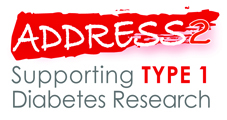The following are studies that used ADDRESS-2 to find and contact candidates, but are no longer recruiting:
T1D Stigma
This project was focused on understanding the experiences of people with T1D, and whether they had experienced any feelings of disapproval and judgement against them as a result of their condition, which is described as a feeling stigmatised or experiencing stigma and that this can be distressing. The study team wanted to assess how this affects a wide range of people with the condition, who is more likely to be affected, how it can affect them and why they feel this way. Participants first completed an online questionnaire and some went on to take part in 2 focus groups focused on any experience or resilience to stigmatising experiences relating to their diabetes.
Alpha-MSH
In the study we are infusing the natural hormone alpha-melanocyte stimulatory hormone (alpha-MSH) to find out if it causes a reduction in blood sugar levels. The hormone infusion is safe, with only flushing of the face reported by some people.
Extod-Immune
The project is for patients with type-1 diabetes (diagnosed within 3 years) who are not physically active. Patients will be asked to undertake an exercise intervention for 12 weeks in their own home, followed by a 12-week control period with no prescribed exercise.
Vera-A-T1D
Summary
Verapamil, a known blood pressure lowering drug, has been shown recently to protect and strengthen beta cells and slows down beta cell destruction in Type 1 diabetes. The aim is to confirm the effect of 360mg Verapamil sustained release (SR) administered orally once daily (titrated over the first 3 months from 120 mg to 360 mg).

MELD-ATG
Summary
People develop Type 1 diabetes (T1D) because their immune system, the part of the body which helps fight infection, mistakenly attacks and destroys the insulin-producing cells in the pancreas (beta cells). When the immune system destroys these cels, the body’s ability to produce insulin decreases, blood glucose levels run high, and T1D develops.
Previous research has shown that a drug called anti-thymocyte globulin (ATG) may help prevent the immune system from attacking and destroying the insulin-producing beta cells. In the MELD-ATG trial, we are looking for the minimum effective low dose of ATG in young people newly diagnosed with T1D that (1) Can slow the decline of beta cell function and preserve the body’s own insulin production and (2) has managable side effects.
EXALT
Summary
The main purpose of this study is to assess the safety of three different doses of an investigational drug in patients who have been recently diagnosed with type 1 diabetes. The investigational drug is a “therapeutic vaccine” and affects the body’s immune system response to a medical condition or disease. It is designed to stop the immune system from attacking cells that produce insulin, which may help insulin production in patients with recently diagnosed type 1 diabetes.
Diabetic Twins study
Summary
This study was aiming to study the influence of environment and genes on the onset of type 1 diabetes using identical twins.




